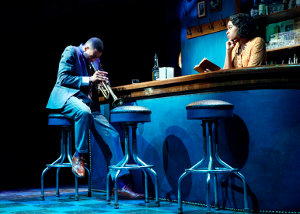
PAULANNE SIMMONS
Searching
for Redemption
Paradise Blue Dominique Morisseau’s “Paradise Blue,” now at Signature Theatre, is the third in her trilogy about African-American life in Detroit (“Detroit ’67” and “Skeleton Crew” are the other two). The most obvious comparison to this jazz-inflected, streetwise drama is any of August Wilson’s 10 Pittsburgh Cycle plays, which also chronicle the black experience in America. For this reason, Ruben Santiago-Hudson, who has helmed several of Wilson’s plays, is an excellent choice for director. “Paradise Blue” focusses on what happens when a jazz joint in Detroit’s Black Botton neighborhood is thrown into turmoil thanks to 1940s gentrification; the erratic behavior of Blue (J. Alphonse Nicholson), the club owner; and the arrival of a sexy and dangerous woman named Silver (Simone Missick). Although at times the drama leans a bit too heavily on racial stereotypes, Morisseau, with the help of Santiago-Hudson’s skillful direction and a cast totally tuned into the nuances of her language, manages to take us beyond the specifics of the set and the story. “Paradis Blue,” like all good drama, is about, much, much more than its people and its plot. Blue is an inspired horn player tormented by memories of his emotionally disturbed father, who established the club, and by the realization that his race will always limit his future as a musician and a man. His music soothes him, challenges him and ultimately cannot save him. Blue’s girlfriend, Pumpkin (Kristolyn Lloyd), takes care of Blue and the club (which doubles as a boarding house). Her timid soul is nurtured by the neighborhood she loves, while her adventurous spirit is encouraged by poetry, which she will recite to anyone willing to listen. We are introduced to two members of Blue’s band; the third has been let go after committing the sin of asking to be paid in a timely fashion. The volatile drummer, P-Sam (Francois Battiste), resents Blue’s authority and the overbearing way he treats his musicians. He suspects Blue is about to sell out to the city, destroying the club and the band’s livelihood. The widowed pianist, Corn (Keith Randolph Smith) tries to make peace. Silver is a bruised but resilient woman who has learned how to take advantage of the men who are attracted to her and protect herself against the men who would abuse her. She has her own plans for the club and will apply any combination of guile, charm and threats to see them realized. While Silver plots in her room, downstairs in the club, P-Sam courts Pumpkin and confronts Blue and Corn mediates. Pumpkin wonders if she can bear to start a new life in Chicago, and Blue tries to face down his demons. Occasionally Silver descends to stir up the pot. So Morisseau’s tight drama is also about the way men and women use and abuse, love and lose each other. It’s about the destructive nature of racism. It’s about community. And it’s about the power of music to comfort but not necessarily heal us. |
| museums | NYTW mail | recordings | coupons | publications | classified |

